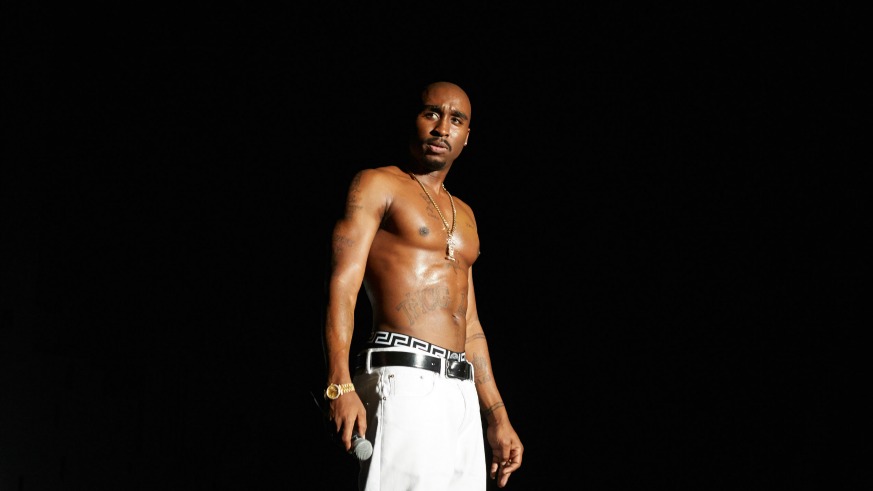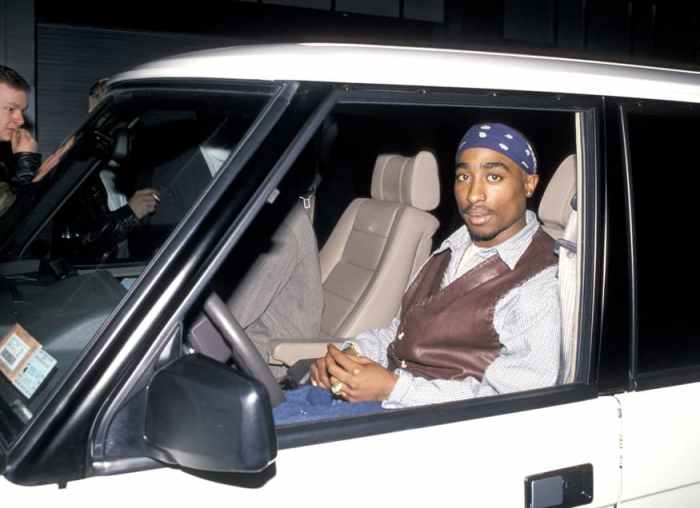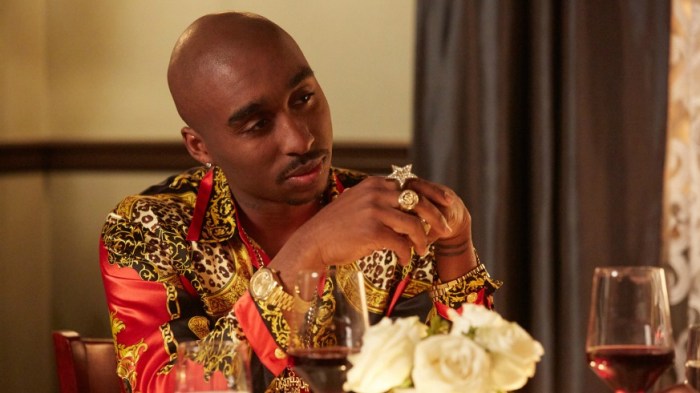We don’t want to dogpile on “All Eyez on Me,” the new 2Pac movie, any more than we have already. It’s a bad film, but it’s the kind of bad film that tries so, so hard to be good. It just has too many things conspired against it — including, we should note, a dearth of filmmaking chops. Despite starring an actor, Demetrius Shipp Jr., who not only looks like Tupac Shakur but does a quite good approximation of his swagger, “All Eyez on Me” winds up failing Tupac Shakur, a brilliant and complicated figure who deserved a movie as strong and alive as “Straight Outta Compton.” Still, it means well.
Or it mostly means well. There’s one stretch of the film where it doesn’t mean well at all. It’s the section where the film has to deal with the fact that Shakur was accused and then convicted of sexual assault.
We may never know what definitely happened, but here are the basic facts: On the night of Nov. 18, 1993, Shakur was staying at the Parker Meridien Hotel in New York City. He had invited a woman, Ayanna Jackson, to join him, along with three of his friends. The two had been intimate days prior; in fact, Shakur later confessed/bragged on “The Arsenio Hall Show” about her giving him “oral” on a club dance floor. That night, however, Jackson alleged that Shakur and his three friends sexually assaulted her.
During the trial and elsewhere, Shakur adamantly, passionately proclaimed his innocence. Shakur was cocksure and charismatic, but he was also incredibly sincere. You may have believed him. You may have wanted to believe him. 2Pac couldn’t have done this — not the man who spoke truth to power, using his records to talk bluntly about poverty, racism, who even recorded “Keep Ya Head Up,” an anthem for women. He maintained his innocence up to the end.
Thing is, Jackson didn’t back down either. In a 2012 article from The Source called “The Reality of Rape and Sexual Assault in Hip-Hop,” Jackson spoke about having to remain anonymous for three years after the alleged incident. She even succumbed to self-blame. “I thought about, ‘Maybe I shouldn’t have hung out at that club, I shouldn’t have gotten involved,’” Jackson said. This blame-the-victim mentality happens too often in cases of sexual assault, and it can even poison the thoughts of those who’ve been allegedly injured.
So it’s disturbing to see how close “All Eyez on Me” comes to blaming the victim. Here’s how the movie handles the story: First off, Jackson — renamed “Briana” (Erica Pinkett) — is introduced butt-first. She’s clad in a skin-tight dress as she shimmies across a club dance-floor. She approaches Shipp Jr.’s Shakur, and they make plans to retire to a quieter space to get it on. In short, she’s a hussy, a starf—er, and her name (which, again, is not even her real one) is spoken by Shakur in the narration track with the mix of fear and hatred with which hobbits utter the name “Balrog.”
A few scenes later, we get to the incident itself. It’s narrated entirely by Shakur. He’s invited Jackson/Briana up to his hotel suite. Shakur gets tired and goes to his room; Jackson/Briana follows him in and starts to give him a massage. But he’s not feeling it, and he retires to another bedroom to sleep. Hours later, he’s awoken by screams. Jackson/Briana says his three friends forced themselves on her while Shakur was comatose and unawares. The next thing he knows, he’s been charged with joining in on the assault, and our good and innocent hero is promptly railroaded by a system designed to take him down.
There are many scenes of Shakur proclaiming his innocence — to reporters, to the judge, on the narration track. We even soon hear “Keep Ya Head Up,” complete with a montage of him handing money to cash-strapped welfare moms — intended to prove he’s not just innocent but also far from a sexist. What he is, the movie tells us, is a victim, and while Jackson/Briana is not onscreen enough to be overtly tarnished as a liar and opportunist, the movie casually, subtly, maybe even unwittingly depicts her as a skank not to be trusted. We know this because she’s introduced butt-first. We know this because she has no other personality traits. We know this because by presenting Shakur as 100 percent, no-doubt-about-it innocent, then the only other explanation for what happened is that she made the story up, or at least the part about Shakur’s involvement in the alleged act.
“All Eyez on Me” doesn’t portray Shakur as a saint, but his more unsavory qualities are routinely toned down or even excised. In the case of the Marin City scuffle from August 1992 that ended with the shooting of a six-year-old boy, the scene is such an incomprehensible flurry of fast-cutting and herky-jerky shots that we can’t even be sure who shot the gun or even if the boy died. The October 1993 incident in Atlanta, in which a righteously enraged Shakur opened fire on two racist off-duty cops who were beating a black man, is shown in full, only to be brushed off the very next scene, with Shakur laughing at his antics like one would after a drunk night out in which you peed on someone’s house. After that, the shooting is never brought up again and we can’t be sure if the filmmakers don’t find it funny, too.
This happens time and time again in “All Eyez on Me”: It flirts with showing Shakur’s dark side, then pulls back, softens the blows, tries to paint him in the best light it can, even if that means withholding the truth. That only adds to the overall crapulence of the movie, which could have been a fascinating portrayal of a man at war with his demons. (In his review, Flavorwire’s Jason Bailey imagines a 2Pac film that’s closer to “Raging Bull,” which sounds about right.) Even Shakur’s biggest fans — including the journalist, Kevin Powell, depicted onscreen during the not-quite-bookending interview sessions — wrestle with the idea that, as Powell puts it, “Something had happened in that hotel room.” Honoring someone like Tupac Shakur means not only taking the bad with the good, but trying to divine how those two sides intermingled — how they added up to a complete and complicated figure.
Making a Tupac Shakur movie that soft-pedals his dark side doesn’t only make it poor art. It also requires doing things like subtly demonizing Ayana Jackson, all the while adding to a culture where survivors of sexual assault are doubted or slut-shamed or both, plus more besides. Most of the time, “All Eyez on Me” is the kind of bad film whose badness makes you feel bad for it. But sometimes it’s the kind of bad film that’s simply bad for the world.
Follow Matt Prigge on Twitter @mattprigge

















